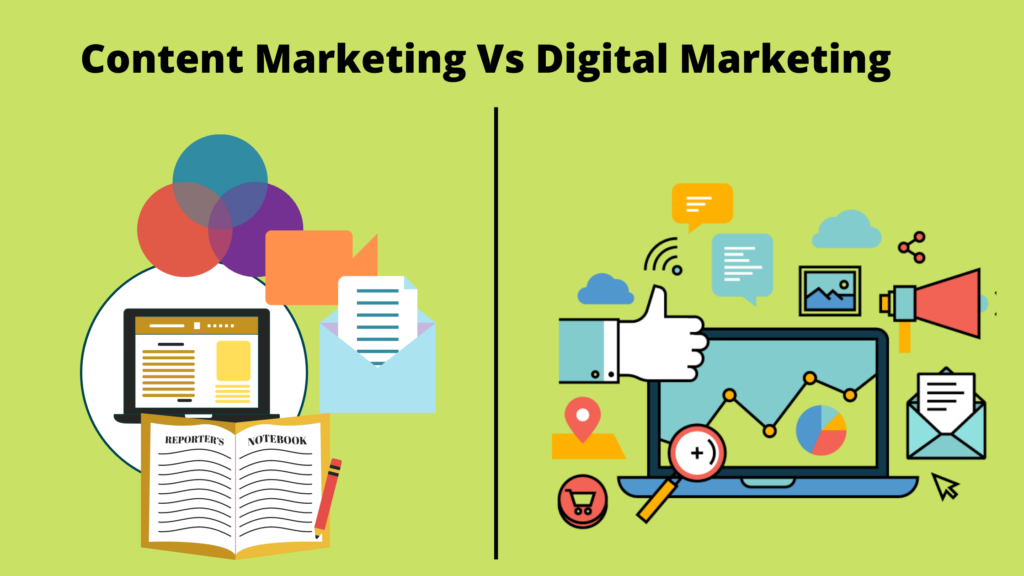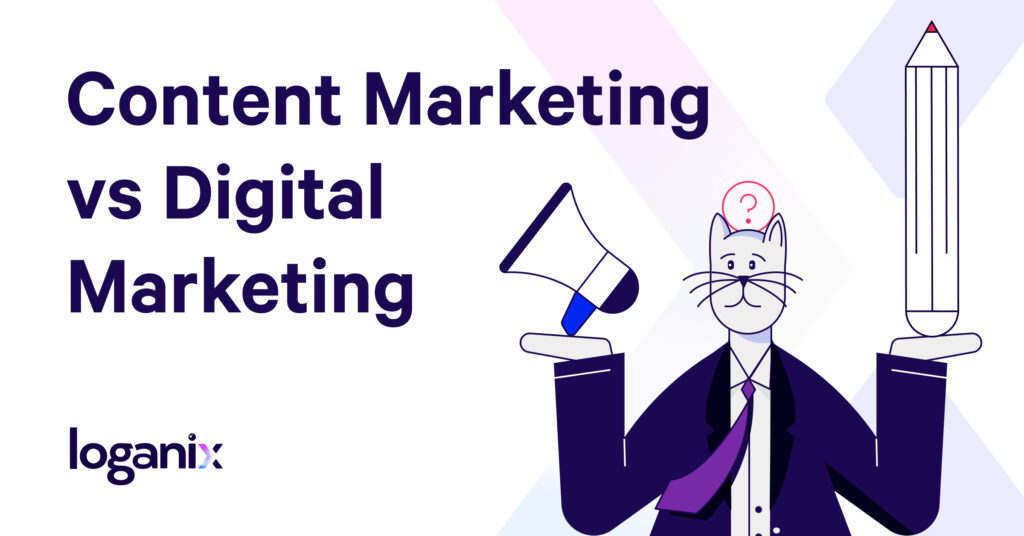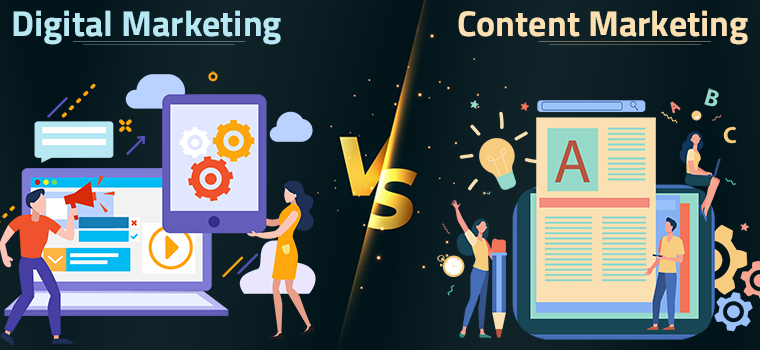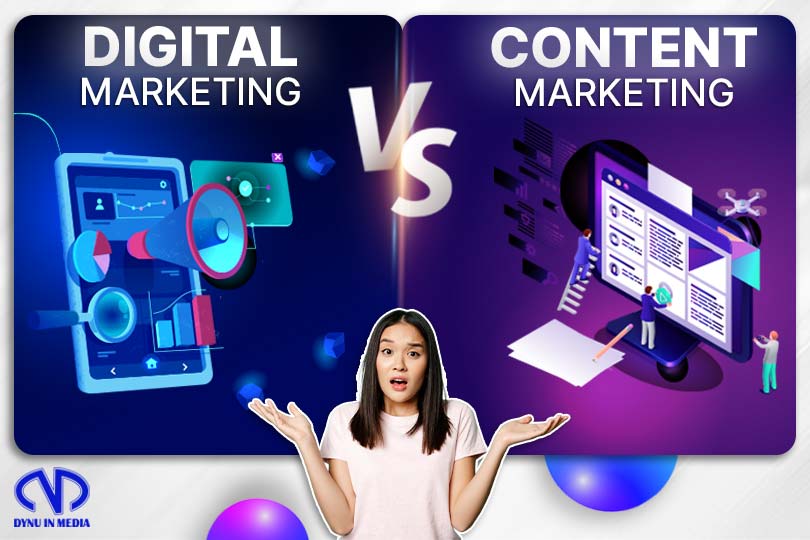In this article, I will discuss the core differences between content marketing and digital marketing. I will explain what each strategy entails, their benefits, and how they interplay with each other. By the end of the article, you will have a better understanding of these online marketing approaches and be able to determine which one aligns with your business goals. We will also explore the current trends in both content marketing and digital marketing, as well as provide answers to frequently asked questions regarding ROI, effectiveness, and team size. Ultimately, the goal is to help you make informed decisions and optimize your marketing efforts in the ever-changing digital landscape.
Content Marketing vs Digital Marketing: The Core Differences
Navigating the digital era can be complex, especially with terms like content marketing and digital marketing leading the charge. What separates them? And which is right for you? This article sheds light on these pivotal online strategies.

Content Marketing: The Art of Storytelling
Content marketing is about crafting and distributing valuable content. It tells a brand’s story and seeks to attract customers by offering knowledge or entertainment without direct selling. Instead of bombarding consumers with traditional advertisements, content marketing focuses on building a relationship and providing value to the audience.
Digital Marketing: The Broad Spectrum
Digital marketing encompasses all online strategies to promote brands, whether through content, PPC, social media, or email. Essentially, content marketing is a component of digital marketing. Digital marketing strategies use various channels and platforms to reach and engage with a broad audience.

Why One Over the Other?
Both content marketing and digital marketing have their strengths and can be effective for different purposes. The choice between the two largely depends on the specific goals and resources of your business.
Content Marketing Benefits
Content marketing offers several advantages that make it a valuable strategy:
Trust & Loyalty
By consistently providing valuable and relevant content, content marketing establishes brand expertise and fosters a loyal audience. When a brand becomes a trusted source of information, customers are more likely to engage, recommend, and advocate for the brand.
Cost-Effectiveness & SEO
Content marketing is often more budget-friendly compared to traditional advertising methods. By creating high-quality content that resonates with the target audience, brands can attract organic traffic to their website, thereby reducing the need for paid advertisements. Additionally, content marketing contributes to search engine optimization (SEO) efforts, improving a brand’s online visibility and organic search rankings.
Digital Marketing Advantages
While content marketing focuses on storytelling and building relationships, digital marketing offers a broader spectrum of advantages:
Reach & Flexibility
Digital marketing allows brands to access vast audiences through various online channels. Whether it’s social media platforms, search engines, email marketing, or display advertising, digital marketing provides flexibility and the ability to adjust strategies in real-time. This enables brands to reach a wider audience and adapt their approach based on audience preferences and trends.
Targeting & Analytics
Digital marketing provides precision targeting capabilities, allowing brands to deliver personalized messages to specific segments of their audience. It also offers detailed analytics and metrics, providing valuable insights into the effectiveness of marketing campaigns. This data-driven approach enables brands to optimize their strategies, measure ROI, and make data-backed decisions for better results.
Interplay Between Content and Digital Marketing
Instead of viewing content marketing and digital marketing as mutually exclusive, it’s important to recognize that these strategies often intertwine and complement each other. Content powers digital campaigns, whether it’s in the form of social media posts, blog articles, or email newsletters. Conversely, digital platforms, such as SEO or PPC, amplify the reach and visibility of content.

Choosing the Right Strategy
The choice between content marketing and digital marketing depends on your business goals, target audience, and available resources. Some businesses may benefit from a content-centric approach, focusing on building trust and establishing thought leadership. Others may find a broader digital marketing strategy more advantageous, leveraging various online channels to reach a wider audience. Often, a hybrid approach that combines content marketing with other digital marketing tactics proves to be the most effective.
Trending in Content Marketing vs Digital Marketing
To stay ahead in the ever-changing digital landscape, businesses must pay attention to the latest trends in both content marketing and digital marketing. Here are some notable trends:
Content Marketing Trends
- Video & Voice: The rise of video platforms, video editing tools, and voice-activated devices offers new opportunities for creating engaging content. The ease of using a video editor has made it possible for brands to produce high-quality videos without the need for professional studios.
- Interactive Content: Interactive content, such as quizzes, polls, and interactive infographics, captivates users more than static counterparts, encouraging interaction and driving engagement.
Digital Marketing Shifts
- AI & AR: Artificial intelligence (AI) and augmented reality (AR) are revolutionizing digital marketing by providing personalized experiences and immersive brand interactions.
- Chatbots: Chatbots are increasingly being used to offer 24/7 immediate responses and improve customer service.

FAQs
What about ROI in content vs. digital marketing?
Content marketing often yields long-term ROI, as it focuses on building relationships and establishing brand authority. Digital marketing, on the other hand, offers quicker, albeit fluctuating, results that can be measured more immediately.
Is content marketing universally effective?
Content marketing can be tailored for any industry, but success may vary based on the breadth and preferences of the target audience.
How can small businesses use digital marketing?
Small businesses can start by leveraging targeted ads, running email campaigns, and focusing on local SEO to maximize their digital marketing efforts.
Is a large team needed for content marketing?
No, the size of the team is not the determining factor for content marketing success. Consistency in delivering quality content and understanding the target audience are more important.
Which is more cost-effective, content marketing, or digital marketing?
Both content marketing and digital marketing have the potential for cost-efficiency, depending on the execution and resources allocated.
How often should digital strategies be revised?
Digital strategies should be regularly revised based on metrics and industry changes. It’s important to stay up-to-date with the latest trends and adapt strategies accordingly for optimal results.
Conclusion
The debate around content marketing vs. digital marketing isn’t about choosing one over the other. It’s about leveraging their strengths in unison. Content marketing and digital marketing are not mutually exclusive, but rather interconnected strategies that, when combined effectively, promise the greatest success in the ever-evolving digital space. By leveraging the art of storytelling through content marketing and utilizing the broad spectrum of digital marketing channels, brands can captivate and engage their audiences while achieving their business goals.
